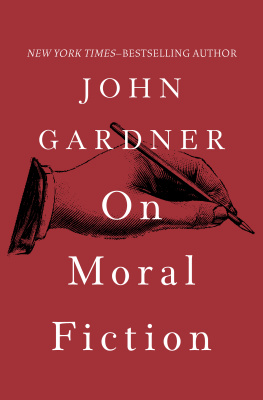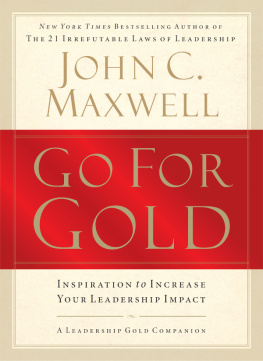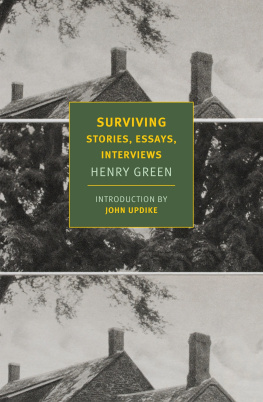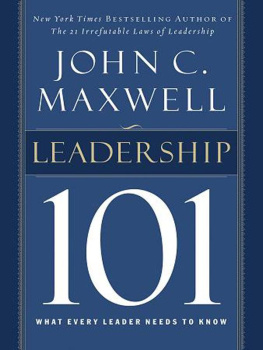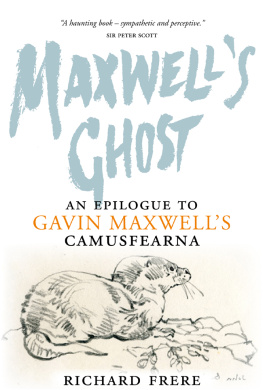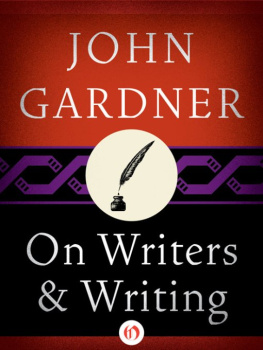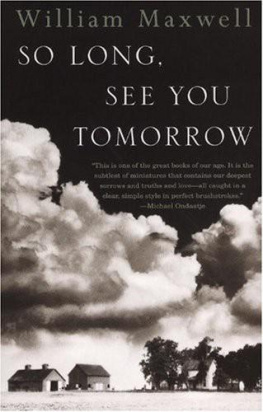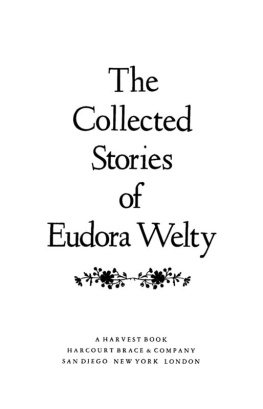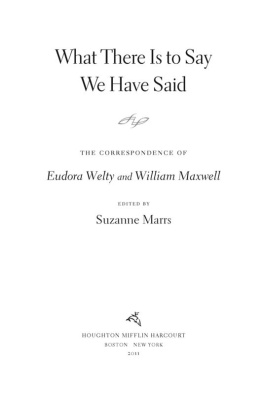Conversations with William Maxwell
Literary Conversations Series
Peggy Whitman Prenshaw
General Editor
Conversations with William Maxwell
Edited by Barbara Burkhardt

www.upress.state.ms.us
The University Press of Mississippi is a member of the Association
of American University Presses.
Copyright 2012 by University Press of Mississippi
All rights reserved
Manufactured in the United States of America
First printing 2012
Library of Congress Cataloging-in-Publication Data
Maxwell, William, 19082000.
Conversations with William Maxwell / edited by Barbara Burkhardt.
p. cm. (Literary conversations series)
Includes bibliographical references and index.
ISBN 978-1-61703-254-7 (cloth : alk. paper) ISBN 978-1-61703-255-4 (ebook) 1. Maxwell, William, 19082000Interviews. 2. Authors, American20th centuryInterviews. 3. EditorsUnited StatesInterviews. I. Burkhardt, Barbara A. II. Title.
PS3525.A9464Z46 2012
813.54dc23
[B] 2011032981
British Library Cataloging-in-Publication Data available
Books by William Maxwell
Novels
Bright Center of Heaven. New York: Harper and Brothers, 1934.
They Came Like Swallows. New York: Harper and Brothers, 1937.
The Folded Leaf. New York: Harper and Brothers, 1945.
Time Will Darken It. New York: Harper and Brothers, 1948.
The Chateau. New York: Alfred A. Knopf, 1961.
So Long, See You Tomorrow. New York: Alfred A. Knopf, 1980.
Short Story Collections
Stories (with Jean Stafford, John Cheever, and Daniel Fuchs). New York: Farrar, Straus and Cudahy, 1956.
Over by the River and Other Stories. New York: Alfred A. Knopf, 1977.
Billie Dyer and Other Stories. New York: Alfred A. Knopf, 1992.
All the Days and Nights: The Collected Stories. New York: Alfred A. Knopf, 1994.
Nonfiction
Ancestors: A Family History. New York: Alfred A. Knopf, 1971.
The Outermost Dream: Essays and Reviews. New York: Alfred A. Knopf, 1989.
Tales
The Old Man at the Railroad Crossing. New York: Alfred A. Knopf, 1966.
For Children
The Heavenly Tenants. New York: Harper and Brothers, 1946.
Mrs. Donalds Dog Bun and His Home Away from Home. New York: Alfred A. Knopf, 1995.
Letters
The Happiness of Getting It Down Right: Letters of Frank OConnor and William Maxwell, ed. Michael Steinman. New York: Alfred A. Knopf, 1996.
The Element of Lavishness: Letters of Sylvia Townsend Warner and William Maxwell, ed. Michael Steinman. Washington, D.C.: Counterpoint, 2001.
What There Is To Say We Have Said: The Correspondence of Eudora Welty and William Maxwell, ed. Suzanne Marrs. New York: Houghton Mifflin Harcourt, 2011.
Contents
William Maxwell / 1955
Bob Adams / 1963
William Maxwell / 1969
William Maxwell / 1969
William Maxwell / 1969
William Maxwell / 1970
William Maxwell / 1971
William Maxwell / 1972
William Maxwell / 1973
Jean W. Ross / 1979
Robert Dahlin / 1979
William Maxwell / 1980
Gordon McKerral / 1981
George Plimpton and John Seabrook / 1981
Gerald C. Nemanic / 1982
William Maxwell / 1985
Geoffrey Stokes / 1985
Barbara Burkhardt / 1991
Bill Aull, Sandra Batzli, Barbara Burkhardt, James McGowan, and Bruce Morgan / 1991
John Blades / 1992
KMOX / 1992
David Stanton / 1994
Harvey Ginsberg / 1994
William Maxwell / 1995
Linda Wertheimer / 1995
William Maxwell / 1995
Kay Bonetti / 1995
Edward Hirsch / 1996
Economist / 1999
Introduction
In William Maxwells later years, he often agreed to interviews with an unusual request: he preferred to answer questions on his typewriter. All the thoughts are in the typewriter, he explained to Edward Hirsch. The typewriter is my friend, he confided to John Blades of the Chicago Tribune, and, I think better on the typewriter than I do just talking, he told me. Maxwells old Smith Coronamatic seemed an extension of his creative mind. With his hands on the keyboardhands that Blades likened to tree roots photographed in fast motionhe was at home in his writers world, crafting words into sentences, arranging and rearranging them until they rested where they belonged in novels such as They Came Like Swallows, The Folded Leaf, and So Long, See You Tomorrow. During interviews, pages he pulled from the typewriter often read like his late published prosethe same bare, elegant style; the kindly, sensitive voice balanced with intellect and emotional steel. Indeed, such conversations with William Maxwell allowed a glimpse of the writer at work.
My interviews with Maxwell began in November 1991 in his apartment on East 86th Street in Manhattan. When my cab pulled up to his building for the first time, I stood for a moment looking up to the apartment windows and across to the park on the rivers edge, the neighborhood that inspired Over by the River, one of his finest stories. I remembered how he once wrote about gazing day after day at the writer Colettes windows at the Palais Royale in Paris. Now he was the one inside, and after a polite inquiry and nod from the doorman in his white, brass-buttoned uniform, I took the elevator to the eighth floor. In his cozy, spare study, Maxwell carefully considered each of my queries, rolled a sheet of paper into the clattering Coronamatic and composed for up to five minutes at a time. He paused occasionally, his lips moving slightly as he reread the words through tortoiseshell glasses. Once satisfied, he turned the typewriter stand around on its squeaky wheels to show me his response. The next summer, he met me at the Croton-Harmon railway station wearing a broad-brimmed straw hat and drove me to his country home in Yorktown Heights. There, he suspended a long extension cord through the back window and brought his Through the last decade of his life, our visits became more informal, over breakfast, lunch, or tea, all lovingly prepared by Mrs. Maxwell.
Maxwells interview method had practical benefits: the typed record prevented misquotes and transcription errors and alleviated his concern that a tape recorder would not pick up his soft, muffled voice. He observed that Vladimir Nabokov, whose work he edited at the New Yorker, did not speak to interviewers, but rather answered questions submitted to him in writing. Maxwells hybrid approachwith the interviewer present and speakingassured accuracy, yet also allowed for a personal interchange. The visitor, freed from listening, had plenty of time to watch the author working and absorb the atmosphere among his photos and paintings and books, or play with his cat, Genji, to the clacking of keys.
Our interviews began when Maxwell was eighty-three, and as the years passed, I wondered with each trip to New York if it would be the last. I arrived with pages of questions numbered and categorized, but sometimes altered my plan, skipping ahead to what seemed most important in case this was my final chance to ask. Our exchanges appear here as they transpiredas Maxwell pulled his words from the Coronamaticoften covering one of his works in depth, then touching on his impressions and preferences in the way of other authors, politics, art, food, and cars. Over time, we often reflected on prior conversations, revisiting issues discussed months or years earlier for clarification and attention to nuance. My side of these interviews has been reconstructed as faithfully as possible: returning home from our first meeting with a long recording of keys clacking clearly established that our conversations could not be captured on audio cassette.
Next page

